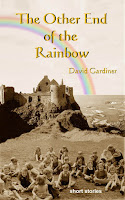 I’d like to introduce you to David Gardiner and his wonderful new collection of short stories “The Other End of the Rainbow.” David is an expat Irishman, a former teacher and “professional student” now living in London. He has previously published the sci fi novel, “Sirat”, and his first short story collection, “The Rainbow Man”, plus a number of stories in magazines and anthologies. He is Co-editor of Gold Dust magazine and volunteer editor for bluechrome and UKA Press. His interests range from science, philosophy, travel, wild life, communal living and alternative lifestyles, to contemporary folk music, photography, scuba diving, IT and cooking and many of these interests have found their way into his stories. David is the organiser of the annual UKAuthors.com holiday for writers and the last few UKAlive writers’ events in London, and he is especially pleased to note that he has recently been presented with his very own London bus pass .
I’d like to introduce you to David Gardiner and his wonderful new collection of short stories “The Other End of the Rainbow.” David is an expat Irishman, a former teacher and “professional student” now living in London. He has previously published the sci fi novel, “Sirat”, and his first short story collection, “The Rainbow Man”, plus a number of stories in magazines and anthologies. He is Co-editor of Gold Dust magazine and volunteer editor for bluechrome and UKA Press. His interests range from science, philosophy, travel, wild life, communal living and alternative lifestyles, to contemporary folk music, photography, scuba diving, IT and cooking and many of these interests have found their way into his stories. David is the organiser of the annual UKAuthors.com holiday for writers and the last few UKAlive writers’ events in London, and he is especially pleased to note that he has recently been presented with his very own London bus pass .
The Rainbow Man is just a gimmick I invented to tie the first collection together, and since people seemed to like him I decided to keep him on for the second collection. I came up with him when I was on a one-week writers’ retreat at a place called Anam Cara in Co. Cork, which I won as a prize in the Fish Short Story Competition. At that point I had a back catalogue of fifteen or twenty stories that I thought might be good enough for publication, but they were very diverse both in style and subject matter and I felt they were more of a heap than a collection. At Anam Cara we did a lot of talking about the craft of story-telling, and I remembered an old story-telling vagrant that I had known in Ireland when I was a boy. I had the idea of resurrecting him, embellishing him quite a lot, and allowing him to introduce each of my stories with some piece of apocryphal wisdom. It seemed to work. People liked him and the heap became a collection. The attraction for me is that he allows me to steer my readers surreptitiously in a particular direction and get them into what I consider the correct frame of mind for what’s coming.
Truth in fiction is a difficult one. Obviously what we write isn’t literally true or it wouldn’t be fiction, but it has to contain truth of another kind if it’s to be any good as fiction: it has to be ‘true of’, to contain insights into human nature and motivation. When the writer is doing his or her job properly you recognise the truth in the piece, it strikes a chord, you find yourself saying in effect: ‘I always knew that but I wouldn’t have been able to put it into words’. When I was a student I had an enormous regard for Solzhenitsyn and I particularly loved his Nobel Prize speech which was all about this aspect of literature. It was published under the title ‘One Word of Truth’. I recommend everybody to read it. ‘Magical Realism’ strikes me as one of these terms invented to give critics something to argue about. It doesn’t really matter if a particular story comes within that category or not; if it contains lots of realism and a little bit of magic that’s more than enough for me.
In every instance, the story comes first, but it’s set up to look as though the story grows out of The Rainbow Man’s reflections. Many of the stories in both collections were previously published elsewhere without The Rainbow Man’s introduction, which rather gives the game away.
* “Intelligent Design” looks at the connection between myth and science. As I tried to explore in “Tangled Roots,” this is an idea that fascinates me. Do you see this as an important central focus of the collection?
Well, I could go on forever discussing your work with you, David, but I should probably leave well enough alone now and just urge everyone to go out and buy it. Read it for yourselves and let David carry you into his world.

“Truth in fiction is a difficult one. Obviously what we write isn’t literally true or it wouldn’t be fiction, but it has to contain truth of another kind if it’s to be any good as fiction: it has to be ‘true of’, to contain insights into human nature and motivation.”
This is so correct. Even if your characters are dancing the waltz on Pluto they must give us a peek into the workings of that human brain.
Very nice interview. I’d love to read the book. Will keep my eyes open for it.